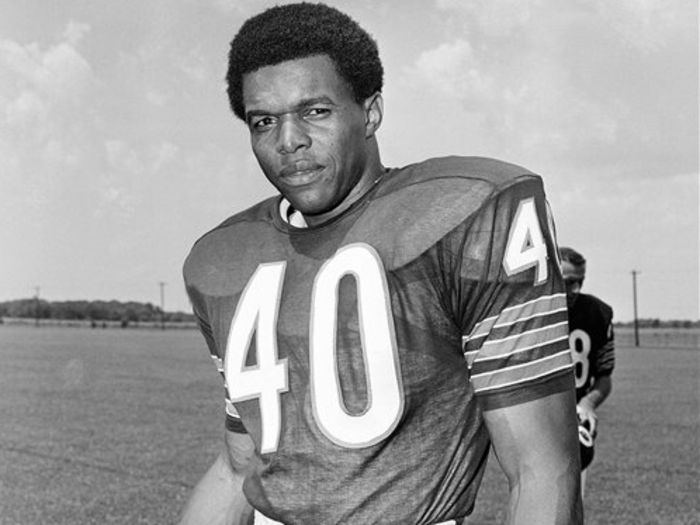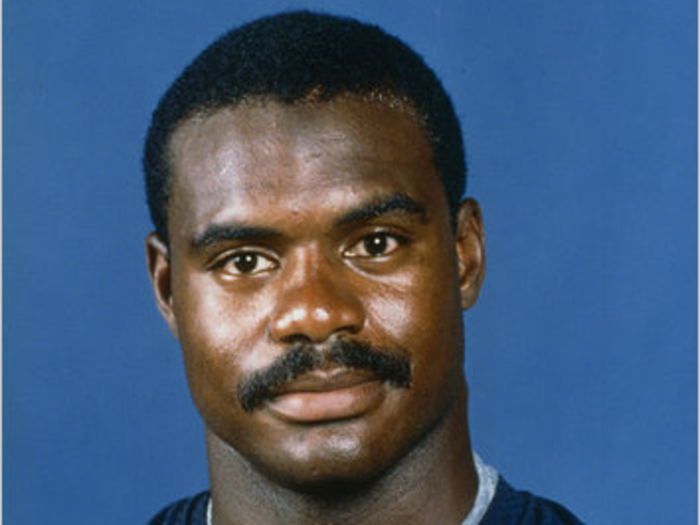- Home
- slideshows
- miscellaneous
- The hardships of 11 former NFL players show why Andrew Luck's early retirement shouldn't come as a surprise
The hardships of 11 former NFL players show why Andrew Luck's early retirement shouldn't come as a surprise
Jim McMahon

Randy Grimes

Former Tampa Bay Buccaneer Randy Grimes developed an addiction to pain killers over his 10-year career.
In an interview with WDIV Local 4 in 2017, Grimes said he would take 30 pills a day. On some days, that number would escalate to 45.
He eventually went to Behavioral Health, a rehabilitation facility in North Palm Beach, Florida. Today, he counsels others who are battling an addiction to pain pills.
Gale Sayers

Former Chicago Bears halfback Gale Sayers was the youngest player ever inducted into the Pro Football Hall of Fame in 1977. His career was cut short by knee injuries.
He was diagnosed with dementia in 2013, but his wife Ardie Sayers believes its onset was years before. Some days he struggles to speak, while other days he struggles to do things. He also experienced memory loss.
While the diagnosis cannot be fully traced to Gale Sayer's football career, doctors believe it played a role.
Sayers received a settlement from the NFL's concussion lawsuit.
Eddie "Boo" Williams

Eddie "Boo" Williams tore his ACL and MCL in his right knee during a 2005 preseason game, which eventually ended his career.
Williams struggled with depression, anxiety, and anger after retiring from the NFL. He attempted suicide in 2011 but was saved by a homeless couple on the railroad tracks.
He spent four months at the Crosby Center in San Diego, where he underwent brain scans and therapy. He now works with the center to advocate for NFL athletes and others who have suffered concussions and other head injuries.
Williams is also a proponent of cannabis as a means to treat chronic pain and neurological problems that have resulted because of football.
Junior Seau

Junior Seau was an NFL linebacker who spent most of his career with the San Diego Chargers. He announced his retirement in January 2010.
In 2012, Seau died by suicide at the age of 43. The National Institutes of Health revealed that he suffered from chronic traumatic encephalopathy (CTE). The disease is believed to be the result of repetitive head trauma and can lead to dementia, rage, and depression.
Dave Duerson

Dave Duerson played 10 years in the NFL before retiring in 1993.
He became successful in the food-services industry but eventually began showing symptoms or brain trauma, including memory loss and abusive behavior.
Duerson died by suicide in 2011. He asked his family to send his brain to the Boston University School of Medicine for research on CTE.
Neurologists confirmed that Duerson had CTE, caused by concussions throughout his playing career.
Dwight Clark

Dwight Clark was a two-time Super Bowl champion and former San Francisco 49ers wide receiver.
Twenty years after his retirement in 1987, Clark revealed he was diagnosed with amyotrophic lateral sclerosis (ALS), also known as Lou Gehrig's disease.
"I've been asked if playing football caused this. I don't know for sure. But I certainly suspect it did," Clark wrote in a statement. "And I encourage the NFLPA and the NFL to continue working together in their efforts to make the game of football safer, especially as it relates to head trauma."
Clark died of the disease in June 2018.
Mike Webster

Four-time Super Bowl champion Mike Webster retired from the NFL in 1990.
After his retirement, he had amnesia, dementia, depression, and acute bone and muscle pain. He also became very agitated and restless.
In 2002, Webster died of a heart attack at the age of 50.
The autopsy revealed that Webster had CTE, making him the first former NFL player to be diagnosed with the neurodegenerative disease. His autopsy is credited with initiated changes in football regarding head injuries and player safety.
Webster's doctors said that multiple concussions caused damage to his frontal lobe, resulting in cognitive dysfunction.
Earl Campbell

NFL Hall of Famer Earl Campbell is known as one of the best power running backs in history but has faced physical ailments as a result.
At 46 years old, Campbell struggled to close his fists due to arthritis in his hands and developed drop foot due to nerve damage, which prevents him from raising the front of his feet to take a step.
In 2009, he was diagnosed with spinal stenosis and became addicted to painkillers. He took Vicodin and Oxycontin with beer. He broke his addiction the same year through a rehabilitation program and has since been an advocate against substance abuse.
Ron Fellows

Ron Fellows played seven seasons in the NFL before retiring in 1988.
In an article published by Deadspin on August 29, 2019, his wife Debra Fellows revealed Ron Fellows was diagnosed with Alzheimer's in 2015. He is experiencing impulsiveness and bouts of rage, according to Debra.
Ken Stabler

Former Super Bowl champion and NFL quarterback Ken Stabler retired in 1984.
He died on colon cancer in 2015.
In his later years, Stabler struggled with memory loss. His brain was removed during an autopsy and sent to Boston University, where researchers discovered he had high Stage 3 CTE.
If you or someone you know is struggling with depression or has had thoughts of harming themselves or taking their own life, get help. The National Suicide Prevention Lifeline (1-800-273-8255) provides 24/7, free, confidential support for people in distress, as well as best practices for professionals and resources to aid in prevention and crisis situations.
Popular Right Now
Popular Keywords
Advertisement